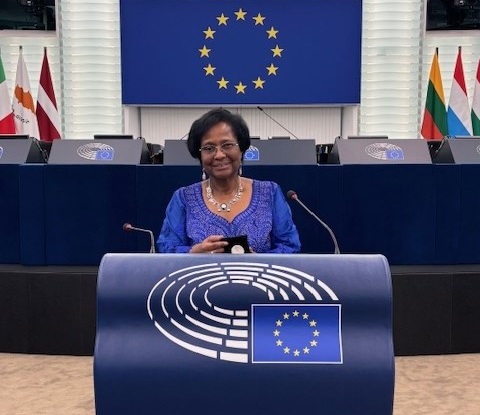Dr Pierrette Herzberger-Fofana, outgoing Member of the European Parliament, writes on the significance of Gambian parliamentarians’ decision not to rescind the ban on female genital mutilation in the west African country
____________________
Female Genital Mutilation (FGM) remains banned in the Gambia. Despite pressure from religious dignitaries and retrograde groups in society who consider female genital mutilation to be an integral part of African culture. For these traditionalist Islamic groups, excision is a religious recommendation that must be respected. However, neither the Koran, nor the Torah, nor the Bible require a girl or woman to be excised.
Withdrawal of the FGM law
Gambian legislators wanted to repeal the current law and re-authorise excision following pressure from religious dignitaries. FGM was outlawed in the country eight years ago and is punishable by up to three years’ imprisonment. Many organisations around the world mobilised. In the European Parliament, we voted by a large majority in favour of a resolution against the Gambian legislator’s draft law. As patron of ‘”ntegra, the largest German Network for the Abolition of Female Genital Mutilation (FGM”), I personally wrote to the Gambian authorities and to my fellow MPs at the national assembly in Banjul, Gambia.

The manifestations of the Gambians’ associations, of the diaspora organisations and of the African associations all over the world, especially the resistance of the women of Gambia on the ground did indeed have a positive effect and success.
Female genital mutilation (FGM) is still prohibited in Gambia. On Monday 15 July 2024, Gambian MPs rejected a draft law after months of controversy and international pressure, Gambian MPs rejected a bill that would have repealed the ban on female mutilation and genital cutting amendments to the 2015 text that would have decriminalised the practice.
Fabakary Tombong Jatta, the speaker of parliament, said: “[We] cannot be engaged in such a futile exercise as to allow the bill to proceed to a third reading. The bill is rejected and the legislative process exhausted.”
Activists all over the world are delighted with this decision and Jaha Dukureh, an FGM survivor and founder of “Safe Hands for Girls”, said:
“Today we stood on the right side of history one more time. We have shown that even if they burn down this country, we will rebuild to protect our women and girls. Today, we won for Gambia.”
Many Gambian girls no longer need to fear that their physical integrity will be jeopardised and that they will fall victim to knives or blades. These utensils are used for the procedure. This good news brings joy to all the people who have supported the Gambian’s women in their struggle.
Human rights groups, UNICEF, the United Nations and the European Parliament had urged MPs to reject the bill as it would have jeopardised years of progress and made The Gambia the first country in the world to reverse the ban on female genital mutilation. This would have made mutilation legal, set a dangerous precedent in terms of rolling back women’s rights, and also undermine Sustainable Development Goal 5, which aims to eradicate female genital mutilation worldwide by 2030.
The Gambia is one of the 10 countries with the highest rate of female genital mutilation: 73% of women and girls between the ages of 15 and 49 have undergone this practice, according to UNICEF figures for 2024. This unique transnational show of solidarity has achieved a great deal and also shows that, together, we can achieve “ZERO TOLERANCE” for Female Genitale Mutilation by 2030.
Despite everything, we must remain vigilant to ensure that female excision does not take place in secret.
With this good news, I say goodbye to you as an Member of the European Parliament. I thank everyone who has supported, motivated and encouraged me during this 9th legislature.
READ ALSO European Parliament calls on Gambia not to legalise female genital mutilation
 THE AFRICAN COURIER. Reporting Africa and its Diaspora! The African Courier is an international magazine published in Germany to report on Africa and the Diaspora African experience. The first issue of the bimonthly magazine appeared on the newsstands on 15 February 1998. The African Courier is a communication forum for European-African political, economic and cultural exchanges, and a voice for Africa in Europe.
THE AFRICAN COURIER. Reporting Africa and its Diaspora! The African Courier is an international magazine published in Germany to report on Africa and the Diaspora African experience. The first issue of the bimonthly magazine appeared on the newsstands on 15 February 1998. The African Courier is a communication forum for European-African political, economic and cultural exchanges, and a voice for Africa in Europe.



































